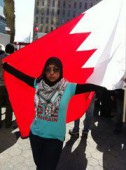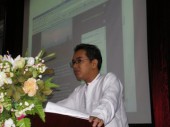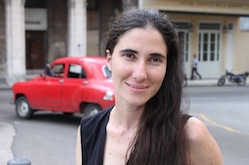The List: Dissidents Online
by Sampsonia Way and translated by Kelly Harrison / July 11, 2013 / No comments

Image via GlobalVoices.
Author: Lino González
This article was originally published in Spanish on www.esglobal.org. Read the original article here.
It’s not easy to be a dissident blogger in some countries. The following list spotlights such activists, whose fundamental rights are being restricted.
Azerbaijan
Khadija Ismayilova: In October 2012, the Azeri investigative journalist received an envelope containing intimate photos of her and the following message: “Whore, behave. Or you will be defamed.” Far from being intimidated, Khadija Ismayilova posted this blackmail attempt on her Facebook page, adding that she wasn’t that surprised; she has spent years exposing the corruption in the Azeri government. One of Ismayilova’s latest articles deals with secrecy in President Ilham Aliyev’s businesses.
Days after she received the threat, a sex tape involving Khadija was made public. The origin of these images: Cameras that were illegally installed in her home. Ismayilova, also a presenter at Radio Free Europe’s station in Azerbaijan, has been active on social networks for many years, including her aforementioned Facebook page and Twitter account (@Khadija0576). The authorities of this small, ex-Soviet, oil-rich republic are doing everything in their power to silence internal dissent. A number of journalists and activists have been charged with extortion and have endured prison sentences for false accusations. In addition, the Nordic telecommunications company TeliaSonera has been accused of giving the country’s authorities—and those of other ex-Soviet republics—control of citizens’ communications.
Recently, after being detained for her participation in a peaceful protest in Baku, Ismayilova refused to pay the fine wagered against her and instead was ordered to do 220 hours of community service.
Bahrain

Maryam Al Khawaja, a dissident blogger in Bahrain. Photo via Facebook.
Maryam Al Khawaja: Born in Syria 26 years ago as the daughter of a renowned human rights defender currently in prison for his activism, Al Khawaja conducts a large portion of her activism through Twitter. Despite facing growing harassment from authorities as she gained notoriety as an opposition activist, Al Khawaja attended the months of protests at Pearl Roundabout. From there she tweeted her impressions and reported on the repression that the police and Saudi soldiers unleashed upon the demonstrators who were, for the most part, Shi’ite—a group socially and economically marginalized by the governing Sunni minority.
Al Khawaja currently resides in Copenhagen, in self-exile, fighting the same oppressive treatment that has plagued her family and friends.
She is acting president of the Bahrain Center for Human Rights.
Burma

Burmese blogger Nay Phone Latt. Photo via Facebook.
Nay Phone Latt: When the protests known as the Saffron Revolution took place in Burma in 2007, many Burmese activists used the Internet to publicize what was going on in the country. Repression was brutal in the months to follow. Many activists were arrested and received long prison sentences, while others were forced into exile. Nay Phone Latt, a blogger who, at the time, owned several cybercafés in Rangoon, was arrested in 2008 and sentenced to 20 years in prison. His sentence was later reduced to 12 years, but he was released at the beginning of 2012 thanks to a government amnesty. Shortly thereafter, the 32 year-old declared that he intended to reactivate his blogs, one in Burmese and another in English —The City I Dropped Down. Nay Phone Latt also said that one of his other projects would be teaching people in the country’s rural areas how to use the Internet. Burma, having a poor telecommunications network, is considered one of the countries with the least permissive laws for freedom of expression online.
Nay Phone Latt is the director of MIDO, a nonprofit based in Myanmar dedicated to the development of the country’s information and communications technology.
China

ChengPeng/Li Chengpeng
Li Chengpeng: Barely known outside his country—because he speaks little English, among other reaons—Li Chenpeng started out as a sports journalist and gained notoriety in 2005 after publishing a book on widespread corruption in the Chinese football league. His popularity increased exponentially when, following the Sichuan earthquake in 2008, he revealed that there were building defects in the area’s schools, a result of the greed of builders and politicians (similar accusations were also made by dissidents such as Ai Weiwei). While Ai Weiwei is unable to use Chinese social networks and has to use foreign websites such as Twitter (in 2012, he created an account on Weibo that had ten thousand followers in less than three hours, before it was shut down by the authorities), Li Chenpeng has an account on Weibo with more than six million followers. He also has a blog in which he reveals some of the most significant problems in Chinese society, particularly instances of mass corruption and poor governance. Recently, he published a book on illegal, forced expropriation, a practice that has made businessmen and politicians rich throughout the country.
Cuba

Cuban blogger Yoani Sánchez. Photo via Facebook
Yoani Sánchez: At the beginning of October 2012, Yoani Sanchez was arrested alongside fellow dissidents as she tried to reach the city of Bayamo to attend the trial of Spanish politician Angel Carromero, who was charged with vehicular homicide after a crash that killed Cuban dissidents Oswaldo Payá and Harold Cepero. Sánchez, arrested alongside her husband, the journalist Reinaldo Escobar, reported having been coerced by the authorities during her 30-hour arrest. Since 2007, Sánchez has become one of the most listened to dissident voices, nationally and internationally, thanks to her blog, Generación Y. Her entries are regularly published by international media, including the Spanish newspaper El País, the Italian magazine Internazionale, and the French Courier International. Her Twitter account, @yoanisanchez, has more than 380 thousand followers.
In January 2013, after 20 attempts, the Cuban government finally granted Sanchez a passport. She has since toured Europe, Latin America, and the US, continuing her work as a journalist dedicated to truth and freedom.
Egypt
Nawara Negm: The Egyptian journalist, blogger and human rights activist Nawara Negm has kept an blog called Gabhet El Tahyees El Shaabeya since 2006. Daughter of the Egyptian poet Ahmed Fouad Negm and journalist Safinaz Kazem, Negm was a spokesperson for the protests that filled Tahrir Square in 2011. With over 500 thousand followers on Twitter, she continues to cover the ongoing political protests in Egypt. Female activists, like her and Asmaa Mahfouz, are renowned figures among bloggers, some of them journalists by trade, born in the 70s or early 80s, who have taken advantage of the Internet’s free space and its potential to mobilize a significant portion of the urban youth in Egypt. Considering the country’s current political situation, their work in bringing about real and profound change has only just begun.
Wael Ghonim, Hossam el-Hamalawy, Wael Abbas, Sandmonkey, and Alaa Abd El Fattah are other well-known young Egyptian activists who, like their colleagues Negm and Mahfouz, supplement their presence in the streets with their work as political and social activists online.
Equatorial Guinea

Juan Tomás Ávila Laurel, a dissident writer of the blog Malabo. Photo via Facebook.
Juan Tomás Ávila Laurel: In February 2011, the Equatoguinean writer and blogger began a hunger strike in protest of Teodoro Obiang’s authoritarian regime. A few days later, following harassment from the Guinean authorities, he traveled to Spain, where he lives today, to continue his protest. Ávila Laurel, 45 years old, is one of the few dissident voices from this African country. On his blog, Malabo, he offers continuous information about the ex-Spanish colony, which is rich in oil but extremely poor when it comes to human rights and acceptable government.
Ethiopia
Eskinder Nega: In July 2012, an Ethiopian federal tribunal sentenced journalist and blogger Eskinder Nega to 18 years in prison, based on national anti-terrorism legislation. On numerous occasions, Nega had criticized the government’s legal exploitation of the threat of terrorism to silence all critical voices in the country. An additional 23 opposing activists were sentenced to lengthy imprisonments in 2012. For a number of years, the Ethiopian authorities have repressed any display of opposition, including dissidents who use the Internet to express themselves (similar to neighboring Eritrea). Print journalists are also subject to repression: Human rights organizations have calculated that, since 2011, 11 reporters have received various criminal sentences, including two Swedish reporters who were accused of collaborating with a rebel group. Recently, a letter from Nega was smuggled out of prison and published in Telegraph. He remains steadfast in his calls for freedom of speech within a true democracy.
Guinea Bissau
António Aly Silva: Active since 2004, António Aly Silva’s blog Ditadura de Consenso is one of the most visited in the former Portuguese colony. The number of visits to the blog grew exponentially in April 2012 when Silva, like many other Guinean citizens, took to the streets in protest and used the Internet to report on the military coup d’etat taking place in the country. Aly Silva wrote about having been arrested by the military: They beat him and took away his cameras, as well as the computer he used to upload his blog entries. He has written a declaration that applies to all of the bloggers on this list and everyone like them who tries to oppose regimes that have little tolerance for freedom of expression: “The first step towards heroism is vanquishing fear.”
Iran
Hossein Derakhshan: The Iranian regime acts with methodical cruelty when imprisoning dissidents who use the Internet to voice their opinions. Hossein Derakhshan is an Irani-Canadian who many consider to be one of the pioneers of using blogs and podcasts to question a theocratic government. Visiting Tehran in 2008 as a Canadian citizen, Derakhshan was arrested under suspicion of espionage. He was sentenced to nearly 19 and a half years in prison in 2010. Currently, he is serving his sentence in Evin Prison, in northern Tehran. The same jail holds other cyber-activists, such as the blogger and dissident Hossein Ronaghi-Maleki, jailed in 2009, and Mehdi Khazali, jailed at the start of 2012. On October 30, 2012, the blogger Sattar Beheshti was also taken to Evin Prison to be questioned by FATA, the Iranian cyber-police responsible for ensuring compliance with disciplinary measures against dissidents who use the Internet. Beheshti died a few days after being detained, on November 3, while in police custody.
Kuwait
Anonymous dissidents: The ongoing protests that are taking place in Kuwait are, perhaps, the least known in the region. Still, in 2012, an extraordinary phenomenon occurred: A number of the demonstrations were organized via anonymous Twitter accounts. The organizers, who asked all comments to be nameless, managed to gather thousands of people to protest the new electoral law that was to be passed for the elections scheduled on December 1, which the opposition eventually boycotted. The protesters also managed to declare the February elections null and void, in which no representative from the opposition nor the Shi’ite minority, historically marginalized, was elected. The protests did not end even after voting. Midway through December, the activists surrounded parliament, whose recently elected members were believed to be illegitimate. Despite being considered one of the more open countries in the Gulf, Kuwait has imprisoned several opponents and cyber-activists, one of whom received a sentence for criticizing the monarchy on Twitter.
Maldives

Hilath Online/Rasheed Hilath
Ismail Rasheed (Hilath): Hilath, perhaps the best known blogger of the little archipelago in the Indian Ocean, was assaulted in June 2012 in front of his house in Malé, the capital of the Maldive islands. He was stabbed in the neck, but, luckily, the attack missed all the main arteries. He suspects that the attack was carried out by radical Islamists. The blogger, who has left the country, has written about the growing power of several members of government that he described as Wahhabi fundamentalists, a branch of Islam that was, until recently, little known in the archipelago. In November 2011, the Ministry of Islamic Affairs blocked access to Hilath’s blog on the sunny tourist islands. He was then arrested in 2012, and released four weeks later, though the ban on his blog still stands.
Morocco

Atheistica/Mahamed Sokrat
Mohamed Sokrat: The young Moroccan blogger was arrested at the end of May 2012 and charged with possession of hashish with the intent to sell. Fifteen days after being arrested, Mohamed Sokrat was sentenced to two years in prison and forced to pay a fine of 5,000 dirhams (approx. 460 euros or 600 dollars). For a number of years Sokrat was involved in activist groups that defended the secularization of Morocco and the democratic extension of freedom. While he did this, Sokrat kept a blog in which he expounded on what, to parts of the Arab world, are very delicate matters: Examples include sexual freedom and respect for the rights of social and religious minorities. His friend and fellow secular activist, the well-known Moroccan blogger Kacem el Ghazzali, lives in Switzerland and has two active blogs, Atheistica and Bahamut, as well as a popular Facebook page. Regarding Sokrat’s arrest, el Ghazzali remarked that in Morocco it’s not unusual for accusations to be fabricated by the police in order to repress dissidents, especially since the Justice and Development Party’s rise to power. In addition to sacred religious values, the Monarch continues to be virtually untouchable, as demonstrated by the February 2012 arrest of young blogger Walid Bahomane, who was sentenced to a year in prison for publishing videos and photos satirizing Mohammed VI on his Facebook page.
Mauritania

Dekhnstan/Nasser Wedaddy
Nasser Weddady: The son of a Mauritanian diplomat, Nasser Weddady became involved in his country’s politics in his adolescence as a member of opposition groups. A refugee in the United States since the year 2000, he was arrested by the FBI a few days after 9/11 during a campaign in which many Arabs were detained, many of them arbitrarily, in the wake of the attack on the Twin Towers. In his blog, Dekhnstan, he not only comments on the politics of his native country, Mauritania, but also on the politics of Arab nations, paying particular attention to the recent revolutions that have changed the dynamics between individual citizens in the Middle East and the powers that look to limit their rights. He also has a Twitter account (@weddady). Weddady, who speaks five languages, including Hebrew, is the co-author of a recently published book on the Arab Spring entitled Arab Spring Dreams: The Next Generation Speaks Out for Freedom and Justice from North Africa to Iran.
Russia
Alexei Navalny: The Russian lawyer and political activist has gained notoriety through the constant reports on corruption that he publishes on his blog (English version). To investigate some authorities and state-owned companies in Russia, Alexei Navalny purchased stock in companies like Transneft, which gave him access to the businesses’ often irregular accounts. In 2010, he published documents that showed that several million rubles had disappeared from Transneft, the public company responsible for managing Russian oil pipelines. Navalny was one of the political leaders who rallied those most critical of the government and took to the streets in protest following the 2011 presidential elections. Along with his blog, he uses his Twitter account (@navalny), which has over 300 thousand followers, to organize demonstrations. The Russian authorities have arrested Navalny on numerous occasions, and in July 2012 they accused him of fraud. According to several human rights organizations, accusations of criminal activity are part of the agenda carried out by the police to silence some of the country’s most renowned dissidents. Navalny has secured a bid to run for mayor of Moscow in the upcoming September election, despite the charges of embezzlement levied against him.
Saudi Arabia
Eman Al Nafjan: For the last five years, the Saudi blogger, living in Riyadh, has been writing about current events in the region ruled by the Al Saud dynasty. Much of her writing comments on the difficulties faced by Saudi women in exercising and developing their rights. Besides writing her blog, Saudiwoman, and using Twitter (@Saudiwoman), Eman Al Nafjan collaborates with numerous international media outlets. Her pieces can found in The New York Times, Foreign Policy, The Guardian and World Policy Journal. Al Nafjan recently wrote the following about Saudi Arabia: “In an absolute monarchy such as ours, political awareness, never mind democracy, is hard to come by.” She added that a lack of democratic tradition does not mean that the Saudi people do not deserve nor want a government that is different than the one they have to endure.
Another notable Saudi blogger is Ahmed al Omran, who currently lives in the U.S. and comments on Saudi Arabian politics and culture on his blog, Saudi Jeans. In some cases, Saudi Arabian blasphemy laws carry the death penalty.
Syria

Razaniyyat/Razan Ghazzawi
Razan Ghazzawi: Since the uprising against Basar Al Assad’s regime, this English literature graduate and resident of Damascus, has become one of the most prominent cyber-activists in Syria. Through her Twitter account (@RedRazan) and her blog, Razaniyyat, both written in English, Razan Ghazzawi constantly provides information on the situation in Syria, paying particular attention to the repression suffered by dissidents. Ghazzawi, along with other activists, has been detained on numerous occasions by the Syrian police, accused, among other things, of inciting sectarian strife. She is forbidden from leaving the country.
Tunisia

A Tunisian Girl/Lina Ben Mhenni
Lina Ben Mhenni: This young Foreign Languages graduate published photos, videos, and comments about the repression of Ben Ali’s regime via her blog, A Tunisian Girl. But the fall of the Tunisian dictator and a nomination for the Nobel Peace Prize have not stopped her from continuing to criticize the situation in Tunisia and other Arab countries. Now she deals with topics such as the legal projects that threaten women’s rights. The Tunisian activists who helped to overthrow the previous government are now, as in other Arab countries, facing a change in strategy: With the old despot toppled, they have begun to focus on reporting the inequality, violence, and corruption that the change in regime has not eradicated. Some, such as Tunisian blogger and noted minister Slim Amamou, will be able to carry out their work by holding important positions in society. Ben Mhenni, besides having an active Twitter account (@benmehnnilina) and Facebook page, has published a book that has been translated into several languages. It is a collection of some of her most noteworthy blog posts uploaded during the months of the uprising that ended with Ben Ali’s downfall.
Vietnam
Dinh Dang Dinh: This activist was one of the most exhaustive and well-known bloggers in the Vietnamese blogosphere, until he was sentenced to 6 years in prison at the beginning of August 2012 for publishing “anti-government propaganda.” Vietnam, governed under a regime that more and more resembles the Chinese government, has, in the last few years, become one of the most repressive Asian nations for opposition activists that use the Internet to criticize authorities. This is emphasized by the numerous arrests made against the country’s Christian opposition, such as that of young Paulus Le Son. The recent sentences have included prison and detention in re-education camps. A month after Dang Dinh was charged, the Vietnamese courts sentenced three more bloggers—Nguyen Van Hai, Maria Ta Phong, and Phan Thanh Hai—to between four and twelve years in prison. They were charged with publishing anti-government propaganda in accordance with article 88 of the Penal Code, the law the authorities use most to persecute dissidents. The continued arrests of bloggers in Vietnam is a violation of the basic human right to free speech.
Yemen

Afrah Nasser's Blog/Afrah Nasser
Afrah Nasser: A journalist by trade who has been active online since 2010, Nasser dedicated herself to reporting on the protests in Yemen, which began in January 2011 and continued until president Ali Abdullah Saleh finally renounced his post at the start of 2012. Interviewed by international media, Nasser has also acted as an unofficial spokesperson for the demonstrators who demanded change in the Yemeni streets. On her blog, she has also reported on American drone attacks that have taken place in her country, like the al-Majalah bombing three years ago, in which 41 people are thought to have lost their lives, including 21 children and 14 women. Nasser has been in self-exile in Sweden—her own words—since May 2011, where she is working for Kvinna till Kvinna.




